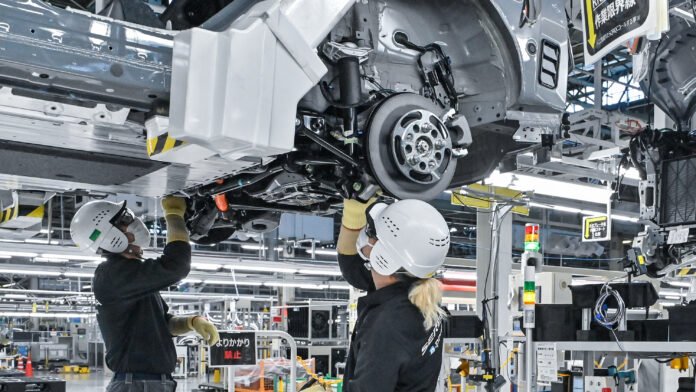Honda and Nissan in converses with developing ties, consolidation conceivable
Chinese EVs present tremendous danger to customary carmakers, Japan Inc
Japan’s vehicle industry comprehensively utilizes 8% of the labor force
TOKYO, Dec 19 (Reuters) – A few associations are brought into the world of need, others from comfort. On account Honda (7267.T), opens a new tab, and Nissan’s (7201.T), opens a new tab for possible consolidation, it is mostly protective as Chinese opponents surprise the world.
While the test from China’s limitless EV mastery poses a potential threat to every single conventional automaker, for Japan it addresses a danger to the tremendous vehicle-producing store network that has been the country’s financial motor for quite a long time.
Honda, Japan’s second-biggest vehicle organization, and Nissan, its third-biggest, are in converses with develop ties, including the chance of setting up a holding organization, two individuals acquainted with the matter said on Wednesday. The automakers are examining an expected consolidation, one individual said.
Like other unfamiliar carmakers, both Honda and Nissan have lost ground in China, the world’s greatest auto market, as BYD (002594.SZ), opens a new tab and other homegrown brands prevail upon shoppers with EVs and half-breeds stacked with creative programming
Honda detailed a 15% drop in quarterly benefits last month, hit by the decrease in China, and has been downsizing its labor force there. Nissan – a long-battling organization – plans to eliminate 9,000 positions universally and produce limit by 20% due to drooping deals in China and the US.
Sanshiro Fukao, a leader individual at the Itochu Exploration Establishment in Tokyo, cautions that the speed at which Chinese EV producers have had the option to develop implies that Honda and Nissan have “no time” to seek after the same old thing.
“We’re as of now not in the age where carmakers would combine, produce benefits through economies of scale and afterward reinvest them in a five-year rebuilding plan.”
Others note that any precarious decay in Japan’s car industry would be especially difficult. It’s the most grounded area on the planet’s fourth-biggest economy and Japan’s situation in other key enterprises, for example, shopper gadgets and chips has melted away throughout the long term.
“For Japan, it’s eventually about vehicles. On the off chance that the car business gets worse, then, at that point, the entire of Japanese assembling won’t improve,” said Takumi Tsunoda, a senior financial specialist at Shinkin National Bank Exploration Organization.
THE Advanced SHIFT
Japan’s auto production network totaled around 60,000 organizations as of May this year, as per a review by research firm Teikoku Databank. All out deals were assessed at 42 trillion yen ($270 billion), identical to 7% of the ostensible Gross domestic product in the 2023 financial year.
Comprehensively, the business utilizes more than 5 million individuals, addressing 8% of the whole labor force, as per the Japan Car Producers Affiliation.
Solidification through consolidations can help by slicing costs and pooling assets however it is not yet clear whether Japan’s vehicle industry – like the U.S. or then again German car industry – can adequately contend in EVs.
Japan’s automakers have been saturated with the country’s practices of “monozukuri” or fabricating craftsmanship, and have been impacted by market pioneer Toyota (7203.T), opening a new tab which altered present-day fabricating with its arrangement of lean creation and in the nick of time conveyance of parts.
Those techniques fostered a culture of gradual improvement and creation line productivity that fueled the Japanese car industry’s ascent from the last part of the 1970s.
In any case, the shift to battery-controlled brilliant vehicles has seen a large part of the buyer’s advantage center around programming-dependent self-driving elements and their computerized insight inside the vehicle – regions where the Chinese succeed.
Among Japan’s automakers, Toyota has been the most vocal about the likely mischief from an emotional shift to EVs, with Executive Akio Toyoda cautioning in October that an EV-just future would prompt many employment misfortunes in the business, particularly at providers and those dealing with motors.
Toyota has long supported what it calls a “multi-pathway” methodology that incorporates creating crossovers, hydrogen vehicles as well as EVs.
Eikei Suzuki, a legislator from the decision Liberal Progressive faction who addresses Mie prefecture – home to a Honda plant and its Suzuka Circuit race course – said he trusted on the off chance that Honda and Nissan were to incorporate, it would build their worldwide intensity.
In any case, that’s what he added assuming the consolidation was to unfavorably affect neighborhood assembling and work, that would conflict with the strategies of Top state leader Shigeru Ishiba, who has sworn to rejuvenate Japan’s common economies.
“We trust that thought will be given to territorial work in Japan,” he said.
($1 = 155.3600 yen)


